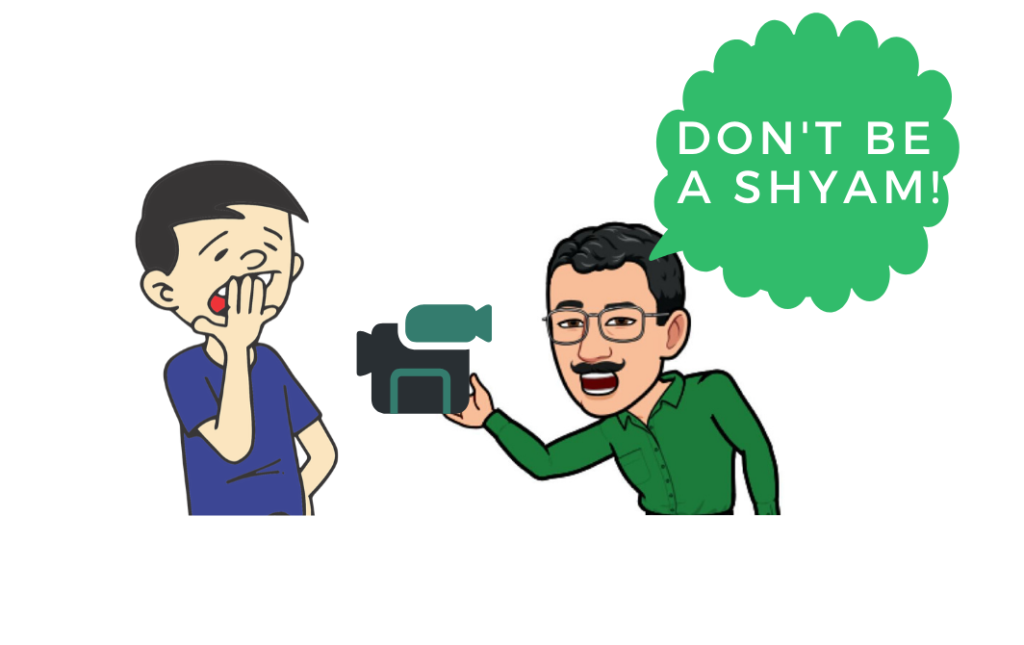A friend of mine wanted me to talk to a friend of his. Let’s call this guy Shyam. Shyam wants to be a film director. He runs a store, here in Kochi, while partnering with a writer to develop a script for his debut feature film.
Wow! Inspiring, is it not? Very similar to my story and aspirations as well. Or I thought. Interestingly my friend wanted me to talk Shyam out of wanting to be a film director! I was surprised by the request, for I am not a fan of talking anyone out of anything.
I am nowadays mostly occupied with sharing what I learnt, through these blogs and the book that I am writing. But I like to take time out to meet new and interesting people. So I went to meet Shyam. And then I understood why my friend wanted me to dissuade him from filmmaking.
Shyam and Me Sitting Under a Tree
Shyam had very relatable aspirations like I had. But had an entirely different world view. Even how we carried ourselves were at opposite ends.
Shyam was a regular looking guy, probably in his late thirties. He had a receding and greying hairline. His hair was unkempt and stubble overgrown. The first few buttons of his checkered shirt were undone. The shirt was untucked and loosely hung above his light blue faded jeans. His black sandals showed wear and tear.
On the other hand I was dressed in the best of my clothes. A well ironed solid shirt in teal. Sleeves neatly rolled up to the elbow. Tucked into an indigo blue jeans. A pair of slightly worn out gym shoes. Though my memory fails me, I would probably have had a shaven face, with a handlebar moustache.
The surprise in his eyes when he first saw me was evident. I was not what he was expecting. Maybe he read the same on my face as well, though I doubt it.
We sat down on the steps of Marine Drive, looking out into the evening sky. The trees shaded us from the heat and the light sea breeze kept us refreshed. We got talking.
Shyam Wants to be a Film Director
Great! But he has never made a short film. Oh, okay. That was strange in this day and age.
Though he hadn’t made short films, he did have experience as a theatre director. Now, that’s a start. Maybe he was at an earlier stage in his filmmaking career. Maybe he was a writer like me. So I enquired more.
Shyam wants to be a film director, but has never written a script. Oh yes! He did say that he had a writer writing the script for him. Writing a script requires a certain set of skills. Asking someone skilled in that to develop one’s story was very common. So he had the story I thought. It turns out he hadn’t.
Shyam wants to be a film director and so he had a writer writing the script, not on a story he had developed, but on a One Line he had developed. A One Line is a commonly used tool in script development.
For example, take this One Line, “A computer hacker learns from mysterious rebels about the true nature of his reality and his role in the war against its controllers.” Nothing that makes you go “ah-ha”, is there? Coming up with that and coming up with the script of The Matrix is not the same thing.
Shyam Will Hire Talented People
Shyam wants to be a film director, but did not know anything about cameras or cinematography. To prove his point, he even narrated to me a story. A friend of his had sent him to a film set. There the cameraman asked Shyam to fetch the ’50’. Shyam had the intelligence to figure out that because it was the cameraman that was asking him, it was probably about a lens. But Shyam did not know what it looked like, or how to identify one.
A good point that Shyam told me was he need not know anything about cameras or lenses of cinematography, because he has a well experienced cinematographer friend who was going to be the cameraman for his debut film. Maybe he was an actor’s director like Prakash Raj or Clint Eastwood and not a technical one. Fair enough.
One major difference in directing a film over a stage play is the immense power a director has in controlling the audience’s perception, and thereby their emotions, merely by changing where the camera is placed and how the footage is edited together. I showed him a video I had made on how an editor tells a story. You cannot tell stories through films, unless you know the basics of film editing.
Shyam said he need not know all this, because he is going to hire experienced associate directors and editors and pay them well. They will know how to shoot a scene and edit together. Shyam wants to be a film director, but did not know how to shoot a scene, or edit it together.
By this point my dear friend Shyam was starting to get on my nerves.
If he had a talented writer who can develop a great story from just a single line, experienced actors who can act, a cinematographer who capture the actor’s performance, associate directors telling all of them what to do, and an editor to put together the film, I asked then what he was going to be doing on set. To which he said he will be the ‘director’.
Where Shyam and I Are The Same
Why I have written Shyam’s case in such detail is because everything he says is what I say too. In fact most of what he said is what you hear from all aspiring filmmakers.
I too will work on my screenplay and develop it to its highest potential. We will work with more experienced technicians and fill gaps in our knowledge. All of us will go from one producer to another till we find that one producer who believes in us and the script. We will all learn on the job and become better filmmakers.
One can only chase those dreams that one believes in. We all need to be rational optimists.
Being Irrationally Optimist
Shyam was the most irrationally optimist wannabe film director I have ever met.
“Essentially, to create things, you have to be a rational optimist. Rational in the sense that you have to see the world for what it really is. And yet you have to be optimistic about your own capabilities, and your capability to get things done.”—Naval
Shyam wants to be a film director. I asked him why any producer should fund his project. Shyam said because the script was brilliant.
I asked him if the script was indeed that brilliant, why wouldn’t the producer buy the script and get an experienced director. Shyam said because it was his story. Yeah, 20 words from a 17,000 word script.
I asked him why anyone should bet their money on him, someone who has never made a film or even a short film, who doesn’t know how to cover a scene or which lens to use, or anything about story or story structure or storytelling. To which he says because he will stand by the producer, be with the project till the very end and deliver a product.
Probably.
I wanted him to think from a producer’s point of view. So I asked Shyam if he wanted to build a house, how would he choose a contractor? Say a contractor approached Shyam and told him that he can build the house, but has never built a house, or even a shed. Would Shyam give all his hard earned money to that contractor? Trust him to build a house that he can someday leave to his children?
Where Shyam and I Are Different
I don’t think he quite got what I meant. He kept saying something like he will learn film direction on the job from all the experienced people he would hire for his debut film. With that experience he would then go on to make a better second film, then a third and so on and he would become a film director.
He seems to strongly believe that he can find someone to trust him and put in ₹ 1,00,00,000 so that he can learn filmmaking. What he was actually telling me was that he does not want to do the work of learning filmmaking unless someone payed him.
My world view is that I work first and then I get payed. My past several years have been dedicated entirely to developing my skills as a storyteller, working days and nights, studying, implementing, learning from mistakes, and making short films. Heck, I even made a feature film on a mobile phone to build my knowledge and credibility!
Even then I am always concerned if I have learnt enough. I know that I know few things, but lots left to learn. I am also aware that there are infinitely more things that I don’t even know I don’t know.
“Know all the pitfalls. Know the downsides, but still keep your chin up.”—Naval
My friend Manu used to tell me that I am a ‘practical dreamer’. I don’t think I quite grasped the entirety of what he meant until I met an impractical dreamer.
“It’s probably better to be an irrational optimist, than it is to be a rational cynic.”—Nivi
Shyam Can Become a Film Director
A rational cynic is someone who “will not only never do anything great in their lives, they’ll prevent other people around them from doing something great. They think their job is to shoot holes in things… They want to tell you why the thing is not going to work.”
Shyam wasn’t a rational cynic. He was an optimist with high hopes and dreams. It’s just that to me it seemed irrational and unrealistic. You never know.
“It’s unrealistic to bend a piece of metal and fly people over the ocean in that metal. Luckily the Wright Brothers and Benjamin Franklin didn’t think so.”—Will Smith
Shyam might in fact find that one person with money who will fund his debut film. Maybe his script is really that great, and he quickly grasps film direction from that one film and goes onto make his second and third films. Shyam can become a film director. There is that 1% probability that it can happen, that luck can strike.
I believe in putting in the work and making my luck.
“In 1,000 parallel universes, you want to be wealthy [or a film director or fill in whatever you want to be] in 999 of them. You don’t want to be wealthy in the 50 of them where you got lucky. We want to factor luck out of it.”—Naval
Listening to Shyam’s beautiful dreams I did not want to be the rational cynic. He asked if I can be an associate director on his film. I politely asked him to call me if his work starts. I wished Shyam all the best and left.
Shyam wants to be a film director, but doesn’t want to do the hard work. Don’t be a Shyam. Learn and go make your films happen.





